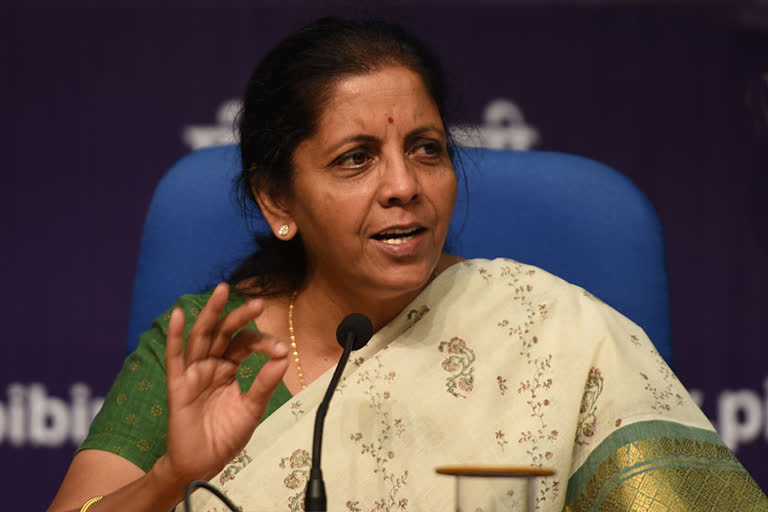New Delhi: Finance Minister Nirmala Sitharaman on Wednesday asked GST officers to foresee the issues faced by domestic businesses and address them proactively so that they can compete on a global scale and build a self-reliant India.
In a message to tax officers on the third anniversary of Goods and Services Tax (GST), Sitharaman also said there is scope for easing compliance further for taxpayers, especially MSMEs.
Asking taxmen to focus on the clarion call by Prime Minister Narendra Modi for an 'Atmanirbhar Bharat', she said for this motto of self reliance tax, especially GST, administration will have a large role to play.
We must foresee the issues faced by our business community and proactively address the same to enable them to compete on a global scale. Only by this proactivity can we ensure much needed economic growth in near future, she said in the message on the occasion of GST Day, 2020.
GST, which subsumed over a dozen local taxes, was introduced on July 1, 2017. Since then the GST process has been simplified and return filing made easy especially for small businesses.
Read more:GST turns 3, but 'one nation, one tax' dream still far from reality
The GST administration has also introduced SMS-based return filing system for 'NIL' filers.
Sitharaman said more efforts are required to ease tax compliance further for taxpayers and made an assurance that the government is committed to continuing these reforms in future as well to facilitate taxpayers.
We must strive to make the tax administration so simple that taxpayers find it easy to comply with all their tax obligations. This is the true essence of 'ease of doing business' as far as tax administration is concerned, she said.
The Minister also said the COVID-19 pandemic has led to some disruptions in the economic activities in the country.
She also congratulated Central Board of Indirect Taxes and Customs (CBIC) and its officers for handholding taxpayers during this crucial time and disbursing record amount of refunds to ease their cash flow.
Traders' body CAIT suggests measures to broaden GST
Traders' body CAIT also suggested a host of measures, like technical audits and waiver of late fees, to broaden the GST base and make the taxation system simple.
The Confederation of All India Traders (CAIT) has made the suggestions to Finance Minister Nirmala Sitharaman as the Goods and Services Tax (GST) regime completes three years of implementation.
"The debut of GST in 2017 was a big reform. It was introduced/ implemented with an aim of one nation one tax and with a view of removing the cascading effect of taxes and providing seamless input tax credit.
Government of all states are working hand in hand with each other and with the Centre in order to make this law more assessee friendly," said CAIT in a communication to Sitharaman.
The traders' body congratulated the government on completion of three years of GST implementation and also appreciated it for bringing gradual changes as and when suggested by the trade.
"We are of the view that the country requires two more years to make GST a stable taxation system provided the GST Council takes stakeholders into confidence and draw ways and means to simplify the system, remove technical glitches, avoid penal actions except on wilful avoidance of tax and make attempts to encourage more and more people to embrace GST taxation system," it said.
Read more:GST collection in June stands at Rs 90,917 crores, shows signs of return to pre-Covid level
It also stressed that "the fear of GST cobweb is needed to be removed" as it suggested measures to broaden the tax base.
The CAIT said the first and most important issue to be addressed is the technical glitches which a trader faces on a regular basis.
"At present because of technical issues, law is being changed. For example initially three GSTR Forms were introduced however, due to technical issues till date, those forms never became a reality and a new Form GSTR-3B had to be introduced," it added.
So, technical audits should be done at regular intervals and the technical team should be given proper training about the law to make the system glitch free, the industry body said.
CAIT said the trader is facing business challenges due to various reasons, therefore, late fees and any type of penalties with regard to procedural compliances should be waived at least for another two years.
Other suggestions include, implementation of recommendations given by various committees set up by GST Council and setting up of a National Advance Ruling Tribunal at earliest.
CAIT also suggested that the date of challan should be treated as the date of payment instead of date of filing Form GSTR-3B and the date of payment received should be treated as time of supply for 2020-21 and input tax credit (ITC) should be unconditional.
(PTI Report)



